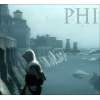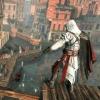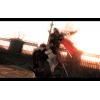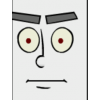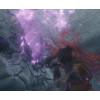What book are you reading right now?
How'd you like the Foundation sequels? Personally I didn't feel like they didn't really live up to the grandness first story. The whole earth thing seemed just like a very unrelated story.
Also Alamut legit one of my favourite books. A re-read this year?
How'd you like the Foundation sequels?
This was my second readthrough of the Foundation series. The original book certainly has a memorable premise. Because it's set up to span 1,000 years you have get used to the characters dying off every few chapters. That includes the series' central character, Hari Seldon, who started off as an old man. I was interested to learn more about Seldon and was pleased that Asimov wrote two prequels covering the early and later parts of his life, respectively.
Foundation starts strong but fizzles into what feels like loosely related short stories... because that's what they were originally. Many people like Foundation and Empire but I'm not big on the Magnifico character. My favorite is Second Foundation, which is actually third in the central trilogy. You're right: the two sequels are flops.
Also Alamut legit one of my favourite books. A re-read this year?
No, I just read Alamut one time. I commented about it in 2022 while reading it and just listed it again as a book I read last year, so it may seem as if I read it twice. As you had mentioned, the second half is more exciting than the first. My jaw dropped at how Suleiman and Yusuf's story was resolved. 
Dun dun dun AC:R and Alamut's connection revealed?
I clearly haven't read the book, and probably should this summer.
Dun dun dun AC:R and Alamut's connection revealed?I clearly haven't read the book, and probably should this summer.
Hahaha, it was a big inspiration for the first AC  You may even recognize some scenes from the game!
You may even recognize some scenes from the game!
Alamut's connection to the first AC I have known for a while now, but just realised that the connection to AC:R was deeper after reading this bit of trivia from the wiki:
Yusuf and Suleiman were the names of two central characters in Vladimir Bartol's Alamut, on which Assassin's Creed is partially based.Spoiler: Highlight to viewThey were the two who performed "leaps of faith" and died for the sake of the paradise promised to them by their Master.
[Spoiler tags added. -stabguy]
Ender's Game (20th Anniversary Edition) by Orson Scott Card
There's something about Ender's Game that I didn't get and it's a major plot element. Most of the book centers around a military training exercise that's essentially laser tag in zero gravity. We're told this is to prepare Ender and the other young soldiers for combat with the alien force. They are given no other training, so I expected actual combat to resemble this game except with live ammunition. When they finally go up against the aliens there are no battles with small arms. Instead, combat only involves
Maybe someone who understands the story well can explain why so much attention was given to the 3D laser tag game.
I thought it was for training of the use of formations and counter-formations and attempting to be creative with those, while dealing with the human factor of subordinates and caring for their well-being. Probably were better ways to prepare them.
Yes, I believe it was more for learning about combat strategies individually and applying them to the actual battles later on. It could have gone without this training and still be the same, though. But it's been over a decade since I read the book anyways.
That makes sense. Thanks guys.
I finished reading 34 books in 2023 (complete list below). My favorite was A Confederacy of Dunces, for which John Kennedy Toole posthumously won a Pulitzer Prize. It's much like a Kurt Vonnegut novel if it were set in New Orleans.
As for non-fiction I recommend Flash Boys. Several other books by Michael Lewis have already been adapted for film: Moneyball, The Blind Side and The Big Short. Flash Boys is similar to The Big Short but even better. They really should make a movie out of it.
Action/Adventure:
Jaws by Peter Benchley
Biography:
My Own Words by Ruth Bader Ginsburg
Business:
Build by Tony Fadell
Wealth Exposed by MJ DeMarco
Crime/Thriller:
Dexter is Delicious by Jeff Lindsay
The Big Sleep by Raymond Chandler
The Shining Girls by Lauren Beukes
General Fiction:
A Confederacy of Dunces by John Kennedy Toole
The Alchemist by Paulo Coelho
General Non-Fiction:
Flash Boys by Michael Lewis
History:
Founding Brothers by Joseph Ellis
A Night to Remember by Walter Lord
Horror:
Dracula by Bram Stoker
Humor:
Still Pickled After All These Years by Brian Crane
Literary Classics:
Breakfast at Tiffany's by Truman Capote
The Grapes of Wrath by John Steinbeck
A Christmas Carol by Charles Dickens
Mystery:
Murder on the Orient Express by Agatha Christie
Politics:
Stupid White Men by Michael Moore
Recreation:
Run Forever by Amby Burfoot
Science Fiction:
Abaddon's Gate by James S. A. Corey
Do Androids Dream of Electric Sheep? by Philip K. Dick
Receptor by Alan Glynn
Jumper by Steven Gould
Nightfall and Other Stories by Isaac Asimov
Stranger in a Strange Land by Robert A. Heinlein
Starship Troopers by Robert A. Heinlein
This Is How You Lose the Time War by Amal El-Mohtar and Max Gladstone
Klara and the Sun by Kazuo Ishiguro
Self-Help:
Four Thousand Weeks by Oliver Burkeman
Digital Minimalism by Cal Newport
Technology:
Beautiful C++ by Guy Davidson and Kate Gregory
Travel:
Atlas Obscura by Joshua Foer, Dylan Thuras and Ella Morton
True Crime:
A Rose for Her Grave by Ann Rule
I just finished the fantasy novel The Way of Kings by Brandon Sanderson. Before that I read the first three Mistborn books, also by him. This comes mostly out of watching his writing lectures at BYU: https://www.youtube.com/playlist?list=PLSH_xM-KC3Zv-79sVZTTj-YA6IAqh8qeQ
I think overall his books are great examples of good fantasy books. I think they play with the genre in a straightforward way, which sometimes can get a little stale. But I also think I'm saying that because his books are more Young Adult focused, and I'm a Real Adult now, and I enjoy Real Adult fantasy like the Malazan Books of the Fallen, which Sanderson describes as "you climb up a steep rock wall by your fingernails, and when you get to the top, boy will you enjoy it".
If you are into fantasy and you want more, or if you are not into fantasy yet and are looking for a place to start, I think his work is a good place to start!
I just finished the fantasy novel The Way of Kings by Brandon Sanderson.
I literally started reading that earlier this year and around halfway through. Before that I read one of his other books Steelheart and the rest in that sci fi series.
161803398874989 wrote:
I just finished the fantasy novel The Way of Kings by Brandon Sanderson.I literally started reading that earlier this year and around halfway through. Before that I read one of his other books Steelheart and the rest in that sci fi series.
What a coincidence haha
How're you liking it so far? Also how was Steelheart?
How're you liking it so far? Also how was Steelheart?
The Way of Kings is great as a fantasy story, and I do love fantasy. Steelheart and the rest in the series are shorter books. I do think they paint a good picture of what would happen if people suddenly got superpowers.
The Way of Kings is great as a fantasy story, and I do love fantasy. Steelheart and the rest in the series are shorter books. I do think they paint a good picture of what would happen if people suddenly got superpowers.
I generally avoid fantasy if it has magic, dragons, fairies, ogres, etc. There are some books about superpowers that I really enjoyed such as The Fermata, Jumper, and any time travel stories without sufficient sci-fi handwaving.
Is Brandon Sanderson for me?
That depends! The Brandon Sanderson stories do have magic, but the magic usually obeys a fixed set of rules, like physics, and part of the fun is figuring out what the rules of the magic are. So far I've not encountered any "soft" (i.e. not-necessarily-consistent) magic in his stories.
Plus the magic used is very limited and very little mythical creatures so far (I'm most of the way through The Way of Kings which is roughly 1,000 pages).
Without giving away much it's about
The Brandon Sanderson stories do have magic, but the magic usually obeys a fixed set of rules, like physics, and part of the fun is figuring out what the rules of the magic are..
Same with Steelheart. Everyone with superpowers also has a specific weakness. The books also add twists that make them different from other stories about superheroes.
time travel stories without sufficient sci-fi handwaving
Speaking of "sci-fi minus science equals fantasy", I read The Midnight Library last year. It was among the 20 books listed below that I finished in 2024. That's much lower than my average of 33 books per year.
The one I highly recommend is The Boys in the Boat, the story of the University of Washington rowing team that competed in the 1936 ("Hitler") Olympics. Perhaps I'm biased because UW is my alma mater, but I think this could be an inspirational book for anyone. Once they qualified for the Olympics this crew became America's team. The book really goes into the details of the sport and has some exciting race sequences. Don't bother with with 2023 movie adaptation. It's totally Disneyfied and would have you believe the athletes were all freshmen who had only been rowing for 9 months.
Biography:
George Harrison: The Reluctant Beatle by Philip Norman
A Promised Land by Barack Obama
Crime/Thriller:
Double Dexter by Jeff Lindsay
Dolores Claiborne by Stephen King
Fantasy:
The Midnight Library by Matt Haig
General Fiction:
The Queen's Gambit by Walter Tevis
Welcome to the Monkey House by Kurt Vonnegut Jr.
Primary Colors by Anonymous
History:
The Boys in the Boat by Daniel James Brown
The Wager by David Grann
Horror:
The Tell-Tale Heart by Edgar Allan Poe
Literary Classics:
Alice's Adventures in Wonderland by Lewis Carroll
The Jungle by Upton Sinclair
Science Fiction:
The Difference Engine by William Gibson and Bruce Sterling
Reflex by Steven Gould
Wealth of Time by Andre Gonzalez
The Last Theorem by Arthur C. Clarke and Frederik Pohl
Self-Help:
Tinnitus: Questions and Answers by Jack A. Vernon and Barbara Tabachnick Sanders
Technology:
Life With Unix by Don Libes and Sandy Ressler
Androids by Chet Haase
I'm going to try something new. Besides giving my top pick (i.e. The Boys in the Boat) I will also name the most overrated book of the year in the hope that it might spare others from buying it.
The most overrated book I read in 2024 was Wealth of Time by Andre Gonzalez. I'm a sucker for time travel books and Kindle was advertising this one heavily with glowing reviews. The sci-fi premise for time travel was thin: "take this pill". It's about a man who goes back in time to learn more about a specific event in his life. For some reason I can't recall, he goes back like six months before the event. Now that he has time to kill, he realizes the school shooting at Columbine High School is coming up and becomes obsessed with preventing it. It's an odd subplot that doesn't fit well with the rest of the story.
Another weird thing is that a character briefly reveals themself to be a "bad guy" but nothing more is said of it. I later found out online that it plays out in the sequel, of which there are five! Andre Gonzalez cranked out six of these in just over two years, so you know they're of the utmost quality.
I'm currently reading The Agony and the Ecstacy by Irving Stone (warning: 784 pages long, 34 hour audiobook). It's the biography of Michelangelo and ties in well with Assassin's Creed II. Both are set in the same time and place: Florence and Vatican City starting from around 1488. There are many of the same characters: Lorenzo de' Medici, Leonardo da Vinci, the Borgia family, and Girolamo Savonarola. Michelangelo actually interacted with most of these people. Too bad he wasn't depicted in the game other than a few of mentions in the database.
Earlier we were discussing fantasy vs. science fiction:
Speaking of "sci-fi minus science equals fantasy"
Coincidentally, a friend outside of THB recently sent me an email arguing that even science fiction isn't worthy of the name:
It has occurred to me that sci-fi hardly deserves the "science" part of its name. Science is concerned with reality. Science is based on observation allied with experiment. Now consider some fundamental elements of sci-fi:
- Faster-than-lightspeed travel: theoretically impossible. Heck, our best space propulsion technology [Project Orion] gives 0.5*c; far short of 0.999*c even.
- Contact with, or even just evidence of, aliens: there has been none, ever.
- Time travel: impossible theoretically, and ridiculous given even just common sense without any physics background.
- Utopias: tried many times, each attempt ending in a resounding failure. Ain't going to happen.
- Artificial intelligence: not even close, after much effort. (Re what is currently being peddled to the ignorant as "AI", we both know to be supervised machine learning coupled with statistical association --- but not any kind of intelligence.)
- Memory export/import to/from digital media, or indeed any nontrivial direct machine interface to brain: nope.
- Immortality: nope.
- Suspended animation: nope.
- Controlled, net energy positive, fusion: nope.
- Matter/energy interconversion: nope.
- Teleportation, psychokinesis, etc.: nope.
- Nullification of gravity: nope.
In other words: if a narrative includes any sci-fi themes, it is not a plausible/realistic narrative! Bodice-ripper paperbacks are more grounded in reality, and hence more deserving to be tagged science-anything.
I think your friend is too pessimistic.
a) I'll just comment that Einstein invented relativity theory in a climate where a lot of people thought physics was more-or-less "finished". Where things moved through the "ether", a stable medium that served as an absolute reference point. That moving around didn't produce clock skew. With our current physics, FTL travel is ~impossible according to our current physics, but that doesn't mean we can't discover new physics.
b) We can't see most of the universe, aliens might not be intelligent/send out signals, etc. The universe is big! And while we're getting better at exploring it every year, I don't think it can be stated that we're good at it yet.
c) Agree with this one. If time travel were possible I'd think we'd have seen the results already, or they invent time travel in an age where there is nothing left of our civilization and so they don't know to go to Stephen Hawking's party for time travelers.
d) Agree with this criticism of Science Fiction. Most of it is staggeringly naive. Some of it is pretty good, but they tend to focus more on slice-of-life kind of things rather than space operas.
e) I'll take Searle's Chinese Room argument for $10, please. This critique is laughable, as one easily say "synapses and dendrites forming connections over time and sending some electrical signals isn't intelligence", which is the same thing.
f) Uploading/downloading memories, I agree there. But there's been progress in brain-computer interfaces. Neuralink apparently has approval for clinical trials in Canada. A monkey moving a mouse cursor using a brain implant was already demonstrated in 2002.
g ) Indeed nope. Bryan Johnson is a fun guy though.
h ) Indeed nope.
i ) A technical net energy gain was produced by the US Department of Energy in 2022, but the lasers they used consumed way too much energy (about 100x what was produced). The lasers this facility operates have been in this form since 2005, with the original design for the facility dating back to 1995. Since then, big progress has been made in laser efficiency: I don't know the exact type of laser they used, but if it's lamp pumped that's a 100x efficiency gain to be made right there. I tried looking for a graph for wall-plug efficiency of lasers over time, but was not able to find one.
j ) We routinely convert matter into energy with nuclear fission (this powers something like 90% of France lol). The other way happens occasionally in large particle accelerators. You can also argue that a lot of industrial processes are matter creation. I.e. with the Sabatier process you can take water and carbon dioxide, and produce methane and oxygen (2 H2O + CO2 -> CH4 + 2 O2). It's pretty energy intensive but it can be done. Is this "creating matter"? Maybe not, but we can do stuff like this.
k ) Psychokinesis I figure might be something downstream from uploading/downloading your consciousness. Teleportation? Idk man, it's the end of the list and I'm getting tired.
l ) It's called an airplane and you've probably used at least one in your lifetime. Alternatively, lookup the Ig Nobel prize winners of 2000. They levitated a frog using magnets, right here on earth.
Anyway, recently I've read the Count of Monte Cristo (fun book once you get into it, like a pre-victorian Batman), the latest in the Malazan Books (good as always), The Blade Itself by Joe Abercrombe (interesting, but getting a little burnt out on fantasy atm), Man's Search for Meaning by Victor Fraenkl (pretty positive for a book about the Holocaust), some books by Brandon Sanderson (aforementioned fantasy burnout, the man manages to innovate on fantasy tropes in the most boring way possible), On The Calculation of Volume by Solvej Balle (very intriguing book, nice read for a lazy sunday), The Left Hand of Darkness by Ursula K. Le Guin (anything by Le Guin is worth it I think, great writer), Blood over Bright Haven by ML Wang (pretty interesting book), and some other stuff that's not coming to mind 
- « first
- ‹ previous
- 1
- 2
- 3
- 4

